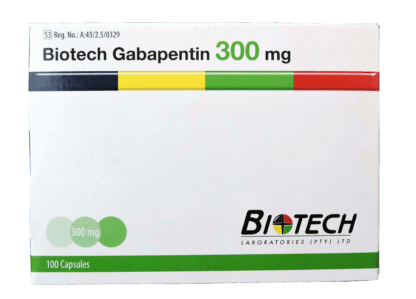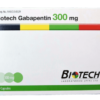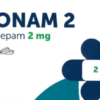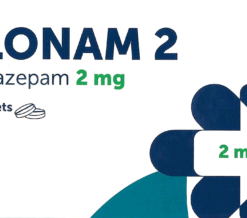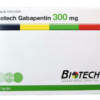Biotech gabapentin (300mg capsule x 100)
$115.14
Biotech Gabapentin (300mg capsule) is a pharmaceutical medication belonging to the class of drugs known as anticonvulsants. It is primarily used to treat various neurological conditions, including epilepsy and neuropathic pain. Gabapentin works by affecting certain chemicals and neurotransmitters in the brain, which helps to reduce abnormal electrical activity and alleviate pain sensations. The 300mg capsule form of Biotech Gabapentin is a standard dosage strength commonly prescribed by healthcare professionals. It should only be taken under the supervision and guidance of a qualified medical practitioner.
Biotech gabapentin is a medication available in the form of 300mg capsules. It belongs to a class of drugs known as anticonvulsants or antiepileptics. Gabapentin is primarily used to treat seizures and neuropathic pain (nerve pain) caused by conditions such as diabetic neuropathy, postherpetic neuralgia (nerve pain following shingles), and fibromyalgia.
When taken orally, gabapentin is absorbed into the bloodstream and works by affecting certain chemicals in the brain that are involved in transmitting pain signals. By modulating these neurotransmitters, it helps reduce abnormal electrical activity in the brain and relieve pain.
Gabapentin is usually prescribed as part of a comprehensive treatment plan that may include other medications or therapies. The dosage and frequency of administration will be determined by the prescribing healthcare professional based on the individual’s condition and response to treatment.
It is important to follow the prescribed dosage and instructions provided by the healthcare professional. Gabapentin capsules should be swallowed whole with a full glass of water, and they can be taken with or without food. Crushing, chewing, or opening the capsules should be avoided unless specifically instructed by a healthcare professional.
As with any medication, gabapentin may cause side effects. Common side effects include drowsiness, dizziness, coordination problems, fatigue, blurred vision, and dry mouth. These side effects are usually mild and tend to improve over time as the body adjusts to the medication. However, if these side effects persist or worsen, it is important to inform your healthcare provider.
Rare but potentially serious side effects may include mood or behavior changes, depression, suicidal thoughts, swelling of the hands or feet, and allergic reactions. If you experience any of these symptoms, it is important to seek immediate medical attention.
Gabapentin may interact with other medications, so it is crucial to inform your healthcare provider about all the medications, supplements, and herbal products you are taking. They can determine if any potential drug interactions exist and make necessary adjustments to your treatment plan.
It is important not to abruptly stop taking gabapentin without consulting your healthcare provider, as it may lead to withdrawal symptoms or a rebound increase in seizures. If discontinuation is required, your healthcare provider will guide you on how to gradually taper off the medication.
Overall, gabapentin is an effective medication for managing seizures and certain types of chronic pain. However, individual responses may vary, so it is essential to closely monitor your condition and report any concerns or changes in symptoms to your healthcare provider.
| Weight | 0.06 kg |
|---|---|
| Dimensions | 3 × 3 × 1 cm |
Related products
Clonam (Clonazepam) is a medication available in 2mg tablets, with a total of 28 tablets per package. Clonazepam is commonly prescribed as a tranquilizer and anticonvulsant. It is used to treat various conditions, including anxiety disorders, panic attacks, and certain types of seizures. This medication works by calming the brain and nerves. It should be taken as directed by a medical professional, and potential side effects and interactions should be discussed with a healthcare provider.
